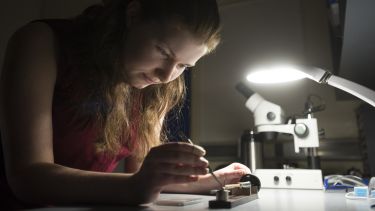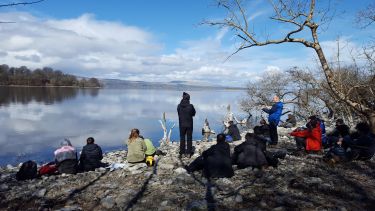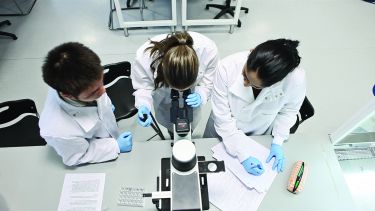Research-led teaching
Throughout your degree you'll get hands-on research experience, learning from and working alongside our expert academics, putting the skills and knowledge you've mastered in lectures into practice.

Our lecturers are experts in a remarkable range of subjects, from genetics, physiology and antimicrobial resistance, to neuroscience, biodiversity, and sustainable agriculture. They’ll introduce you to key concepts and the latest research findings - but you won’t just learn through lectures. In small group tutorials, you’ll work through scientific problems and increase your analytical abilities with supportive academic staff.
We’re proud to have been in the top five nationally in the Research Excellence Framework (REF) for 20 years, meaning you will be learning from many of the best researchers in the country.
You’ll also learn by doing. We put a big emphasis on developing your practical skills in our state-of-the-art labs and in the field. A big chunk of your week is devoted to practical sessions and research projects, designed to challenge you once you’ve mastered the essentials.
How we teach
Lectures, tutorials and workshops
Lectures are a big part of university life – a chance to learn the fundamentals from recognised experts and get insights into the latest research. You'll also have tutorials and workshops to build on the topics you've covered in lectures and show you how to apply concepts to solving real problems. These small group teaching sessions are led by your personal tutor who is there to guide and support you through your studies and help you to start planning your next steps, during and after your degree.
Our lecture recording system means you can watch your lectures again later to reinforce your knowledge and understanding of certain topics. These recordings are a great resource for revisiting content between lectures, during exam revision, or catching up if you were absent.
Practical teaching
In your first and second year you’ll spend between three and six hours every week in our dedicated teaching labs, developing the practical science skills that every bioscientist needs, including how to handle equipment, design experiments and interpret data, ready to put your new skills into practice in third year with a semester long research project. If you are studying aspects of plants, animals, microbes and soils, you’ll also partake in practical work outside in local green spaces, local and regional Wildlife Trust sites and even the Peak District National Park that’s on our doorstep.
Research projects
Project work is built into our degrees from the beginning, allowing you to start developing your research skills.
Your first week at University involves research projects associated with your degree. You’ll have a chance to do more research projects throughout your first and second years. And in the third year of your BSc, you'll tie your scientific skills together with an in-depth, captstone research project and dissertation. Working in a team, you'll go from a concept and hypothesis, through all the research and analytical stages, to produce a written report of your findings. If you do one of our research-intensive integrated masters degrees (MBiolSci or MBiomedSci), you'll get to do an even bigger project in fourth year, where 80% of your time is dedicated to research.
Spotlights
You'll have lots of opportunities throughout your degree to be creative, think independently, and express your ideas. No matter which programme you choose, you'll get the chance to put your new knowledge into practice in a variety of ways, gaining new skills and experience to put on your CV throughout your course. Here are some highlights:
Field courses
All of our Biological Sciences and Zoology students have the opportunity to take part in field trips and field courses throughout their studies.
Work in the Julia Garnham Centre
Each year, a number of our students get the opportunity to spend time working in our Julia Garnham Centre, based here in the School of Biosciences. The centre is a genomic pre-screening facility which helps NHS geneticists to diagnose blood cancers.
As part of the third-year project research project in clinical diagnostics, students get the chance to use the skills and knowledge they've gained so far to help the NHS in dealing with backlogs in cancer diagnosis, potentially saving a life before they even graduate.
Students receive clinical training in diagnostic genomic analysis, and get to work under the supervision of NHS Geneticists from the Sheffield Children's NHS Foundation Trust.
Find out more about the Julia Garnham Centre
Excellence in teaching
All of our staff are committed to great teaching. Several have been given awards from the University of Sheffield, or have earned professional recognition for the innovative and engaging ways they have helped students learn across the biosciences.
University of Sheffield Senate Awards for Excellence in Learning and Teaching
- Professor Louise Robson
- Dr Emma Jones
- Dr Rebecca Barnes
- Dr Nicola Hemmings
- Dr Nicola Nadeau

International undergraduate scholarships
We are offering scholarships of £2,500 for each year (subject to a 60% average) of your undergraduate degree. The maximum value is £10,000 for four-year programmes.


